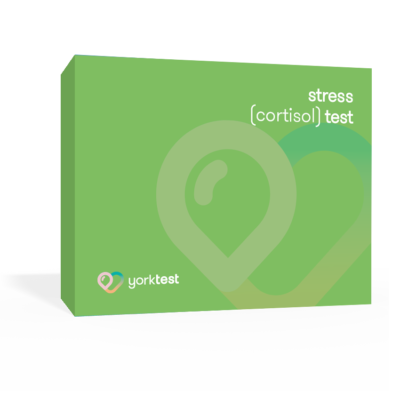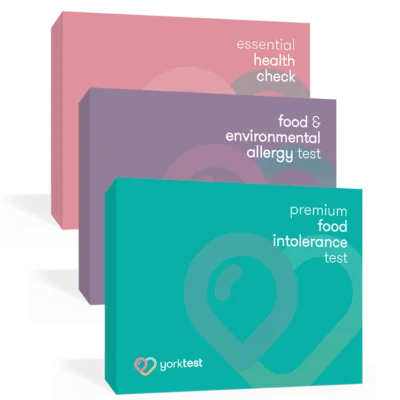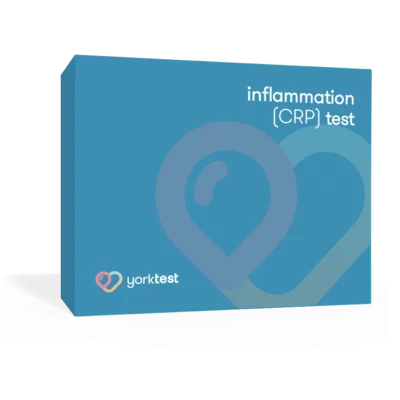Stress (Cortisol) Test
£41
PayPal Credit is like a credit card, without the plastic. It's a credit limit that's attached to your PayPal account which you can use for your online purchases. 0% interest for 4 months is available on single transactions of £99 or more. Find out more
- Add items to your Basket
- Select PayPal as your payment method at checkout
- Log into your PayPal account and chose PayPal Credit as your payment method or apply for PayPal Credit
Representive Example
Representive 23.9% APR (variable); Purchase rate 23.9% p.a (variable); Assumed credit limit £1200.
Credit subject to status. Terms and conditions apply. YorkTest acts as a broker and offers finance from a restricted range of finance providers.
PayPal Credit is a trading name of PayPal (Europe) S.á.r.l et Cie, S.C.A, 22-24 Boulevard Royal L-2449, Luxembourg.
30% OFF SALE ENDS SUNDAY
+ FREE Delivery on all orders
Check your level of cortisol, your stress hormone, with this simple at home Cortisol Test
Identify whether your stress hormone levels could be impacting your life, your immunity and your health
- Test your early morning cortisol level (stress hormone)
- Simple at-home finger-prick blood test. No social interaction required
- Provides hospital standard, easy-to-read traffic light results
- Supporting guidance provided to help you make effective lifestyle changes
- Receive advice to better support your overall health
- Customers must be aged 18 years or over to take this test. This test is not available to customers who are pregnant or breastfeeding
- Only available in the UK
Optimise your health at home by testing your cortisol levels
Understand whether stress levels may be impacting your health and what simple steps you need to make to reduce them.
A small amount of stress can be seen as a good thing, helping you to cope day to day. However, when stress levels start to increase then that is a different matter. Stress can start to impact your daily life in lots of different ways, but how do you know if you are putting your body under too much stress?
The good news is that cortisol (stress hormone) levels can be detected and monitored using the Stress (Cortisol) Test. Raised or low levels of cortisol can tell you if stress could be impacting your health and whether you need to make lifestyle changes or visit your GP.


4 Simple Steps to a Healthier You
What's in the test?


Your kit includes a free return envelope included, making it easy for you to post your sample back to us securely. You can leave the rest to us, while our team of diagnostic experts analyse your sample at our partner laboratory
- Stress (Cortisol) Test
- A prepaid return envelope
- Two single-use lancets
- One blood collection tube
- One blood collection tube label
- One plastic blood collection tube case
- Two adhesive plasters
- A cleansing wipe
Take care of yourself with our Stress (Cortisol) Test
Using a quick and easy home-to-laboratory finger-prick blood test. Get your results within 7 days, and you will receive advice on whether your results are acceptable, if lifestyle changes are required, or if a visit to your GP is recommended. Lifestyle guidance is also provided.
Being aware of your cortisol (stress hormone) level is a first step to making positive changes. It is also easy to track your levels of stress over time.
Take steps to change your life for the better


Cortisol Test - FAQs
What does cortisol do in your body?
Most of us know that cortisol is the primary stress hormone in our bodies that’s released when we experience moments of anxiety, fear, or other stressful events. While cortisol is often viewed as a stress hormone that contributes to weight gain, skin conditions, and other adverse symptoms, cortisol is an essential hormone that influences our body’s ability to metabolise glucose, control blood pressure, regulate inflammation, and respond to danger.
Cortisol is one of several steroid hormones that are produced by the adrenal glands, which are regulated by the pituitary gland. When released into the bloodstream, cortisol can influence many parts of the body, such as the liver, pancreas, muscle tissues, and insulin production, Cortisol is a necessary component to the fight or flight response – which is a natural reaction to perceived threats – but it’s also released in stressful situations that are less threatening.
Having the right balance of cortisol hormone is essential for optimal health, which is why testing your cortisol levels can be an important measure to know exactly where your body stands and what, if any, action you should take to better balance this important stress hormone.
How do you test cortisol levels at home?
There are some at home cortisol tests that allow you to measure your cortisol levels from the comfort of your home. When using an at-home cortisol test kit, it’s recommended to choose a cortisol blood sample via finger prick over a cortisol saliva test or urine test. Cortisol blood tests are the most accurate and provide a reliable measurement of your levels.
YorkTest offers a simple finger prick at home cortisol blood test sample test to measure cortisol levels and results are provided in an easy-to-review report within 7 days. Our results will provide detailed guidance on your results to show if you have normal cortisol levels, and advice going forward.
Why do you have to take a cortisol test first thing in the morning?
The timing of the cortisol test is critically important because of the way cortisol levels vary throughout the day. In most cases, it’s recommended to do a cortisol blood test in the morning hours. Your morning cortisol level is the best indication of whether you have a normal cortisol level. Morning cortisol levels (around 30 minutes of waking up) are typically the highest point in the day, and then fall over the course of the day.
Why can't I exercise before taking a cortisol test?
Physical exercise temporarily increases the levels of cortisol in your blood.
Is a cortisol blood test an accurate measure of stress levels?
A blood test is an accurate measure of cortisol, and cortisol levels are related to stress levels. Blood cortisol levels reflect both protein-bound cortisol and free cortisol whereas a saliva or urine test only tests free cortisol levels. Cortisol in the blood is at its highest in the morning and lowest later in the day. Blood cortisol levels can also reflect more serious conditions and so it is always wise to consult your doctor if you are concerned about your cortisol levels.
How to reduce cortisol levels?
There are certain strategies that are suggested to maintain healthy levels of cortisol:
– Regular low-moderate exercise.
– Get the right amount of sleep.
– Spending time in the great outdoors.
– Mindfulness and recognising stressful thinking.
– Breathing exercises.
– Eating a nutritious, balanced diet.
– Certain supplements (e.g., fish oils).
Case Studies


Matt Perry
“A simple test and re-education on your eating habits can turn your life around”
- IBS / Digestive Problems
- Tiredness / Fatigue
- Weight Management


Julie Castledon
- IBS / Digestive Problems
- Nausea
- Tiredness / Fatigue


Alison Dunn
“The entire engagement with YorkTest from end to end was very easy, professional and fast”
- IBS / Digestive Problems


Lynne Williams
“All my symptoms have noticeably decreased. I feel excited and alive again.”
- IBS / Digestive Problems
- Mental Health
- Tiredness / Fatigue


Bianca Dodds
“I feel less bloated, I have more energy and more clarity of the mind.”
- Brain Fog/Inability to Concentrate
- IBS / Digestive Problems
- Tiredness / Fatigue


David Brown
“I am a different person and the brain fog, anxiety and depression have now disappeared. I feel reborn and finally have my life back”
- Mental Health
- Tiredness / Fatigue























